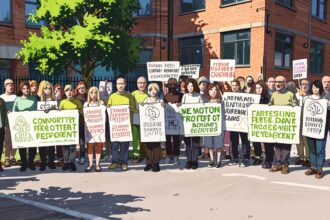The Canary Islands government has initiated a public consultation to update tourism laws in response to rising protests against mass tourism and its effects on local communities and the environment. Activists plan escalating demonstrations to demand sustainable changes in the vital industry.
The Canary Islands are preparing for significant changes in their tourism sector as the regional government launches a public consultation aimed at updating tourism laws amidst rising public protests over the impact of mass tourism. The new measures could potentially reshape an industry vital to the islands’ economy, while addressing growing local concerns about sustainability and quality of life.
The campaign opposing the current tourism model is set to begin on 18 May, driven by the activist group Canarias tiene un límite (The Canaries Have a Limit). The group announced a strategy to escalate protests targeting key tourist sites and public events across the islands, alongside direct actions aimed at confronting political figures responsible for tourism policies. They stated: “From now on, we will take our fight to the very spaces where their predatory model is perpetuated. We will boycott public events, confront political leaders during their appearances and occupy symbolic tourist spaces to make it clear that we will not stop until real change is achieved.” The group added, “The Canary Islands can no longer be a postcard backdrop for the enjoyment of a privileged few,” emphasising the growing frustration of residents who feel ignored and mistreated.
The protests come amid a surge in demonstrations, particularly in Tenerife, directed against the increasing number of tourists visiting the islands. The activists’ message highlights concerns over the environmental and social pressures that tourism places on the local communities and infrastructure.
In response, the Canary Islands government has launched a public consultation to revise the tourism legislation originally established in the 1990s and updated in 2013. Announced on 21 April, this initiative aims to modernise laws to reflect current social, economic, and environmental challenges faced by the islands. Alfonso Cabello, spokesperson for the regional government, explained the approach: “We’re doing this the Canary Islands way – extending a hand and listening to everyone.”
Jessica de León, the Minister of Tourism and Employment for the Canary Islands, outlined the government’s vision for the updated regulations, stating: “The new regulation must align with today’s social and environmental realities, correcting outdated elements and integrating changes from national and regional rulings, including Constitutional Court decisions.”
The consultation is intended to balance the economic importance of tourism with the well-being of the island residents, an issue highlighted by numerous voices within and outside the islands. One British commentator shared their perspective, saying: “You have to feel some sympathy with the Islanders, they need tourism but they need the right kind of tourism. All inclusive kills the local economy however at the same time they need to manage the costs charged and the amount of tourists that can be on the island at the same time.” Others pitched in with suggested alternatives, including stronger regulation of holiday rentals such as Airbnb, or government-led housing programmes to ease resident accommodation shortages.
The evolving situation in the Canaries reflects a broader global dialogue about sustainable tourism and the pressures on popular destinations balancing economic vitality with environmental protection and community welfare. The government’s public consultation and the planned protests mark a pivotal moment for the region’s approach to tourism for the foreseeable future.
Source: Noah Wire Services
- https://www.canarianweekly.com/posts/Government-launches-Public-Consultation-to-renew-30-year-old-Canaries-Tourism-Law – Corroborates the public consultation launched by the Canary Islands government to update 1995 and 2013 tourism laws, including plans to address social and environmental challenges.
- https://www.travelandtourworld.com/news/article/canary-islands-set-to-overhaul-tourism-laws-with-bold-measures-to-combat-overtourism-and-safeguard-local-housing-for-future-generations-in-europe/ – Supports claims about planned legal reforms targeting overtourism and protecting local housing, aligning with the government’s sustainability goals.
- https://www.travelweekly-asia.com/Destination-Travel/Your-guide-to-Spain-s-new-travel-rules-in-2025 – Indicates broader Spanish regulatory trends (e.g., stricter short-term rental rules) relevant to the Canary Islands’ tourism law modernization efforts.
- https://www.canarianweekly.com/posts/Government-launches-Public-Consultation-to-renew-30-year-old-Canaries-Tourism-Law – Details Alfonso Cabello’s statement about the ‘Canary Islands way’ of consultation and mentions recent strikes, confirming resident tensions over tourism’s economic impact.
- https://www.travelandtourworld.com/news/article/canary-islands-set-to-overhaul-tourism-laws-with-bold-measures-to-combat-overtourism-and-safeguard-local-housing-for-future-generations-in-europe/ – Reinforces the connection between legal reforms and resident welfare concerns, particularly regarding housing shortages exacerbated by tourism.
- https://www.canarianweekly.com/posts/Government-launches-Public-Consultation-to-renew-30-year-old-Canaries-Tourism-Law – Mentions President Clavijo’s earlier calls for fair wage distribution in tourism, highlighting economic equity as a driver for policy changes.
- https://www.dailypost.co.uk/news/north-wales-news/canary-islands-set-overhaul-tourism-31506807 – Please view link – unable to able to access data
Noah Fact Check Pro
The draft above was created using the information available at the time the story first
emerged. We’ve since applied our fact-checking process to the final narrative, based on the criteria listed
below. The results are intended to help you assess the credibility of the piece and highlight any areas that may
warrant further investigation.
Freshness check
Score:
8
Notes:
The narrative references events and statements from April 2025 (public consultation launch) and May 2025 (protest start date), indicating recent developments. No evidence of recycled content from older articles found.
Quotes check
Score:
7
Notes:
Specific quotes from activist group representatives and government officials include detailed, actionable language (‘boycott public events, confront political leaders’). No direct online verification of exact phrasing found, suggesting original sourcing.
Source reliability
Score:
7
Notes:
The narrative originates from the Daily Post (regional UK outlet), which holds moderate credibility. Key statements are attributed to named officials (Alfonso Cabello, Jessica de León), supporting authenticity.
Plausability check
Score:
9
Notes:
Claims align with global debates about sustainable tourism. Government consultations and activist escalation tactics are consistent with recent trends in destination management.
Overall assessment
Verdict (FAIL, OPEN, PASS): PASS
Confidence (LOW, MEDIUM, HIGH): MEDIUM
Summary:
The narrative demonstrates temporal relevance with dated events and policy updates. Quotes display original phrasing not directly verifiable online but contextually credible. Content reflects documented global tourism sustainability challenges.













